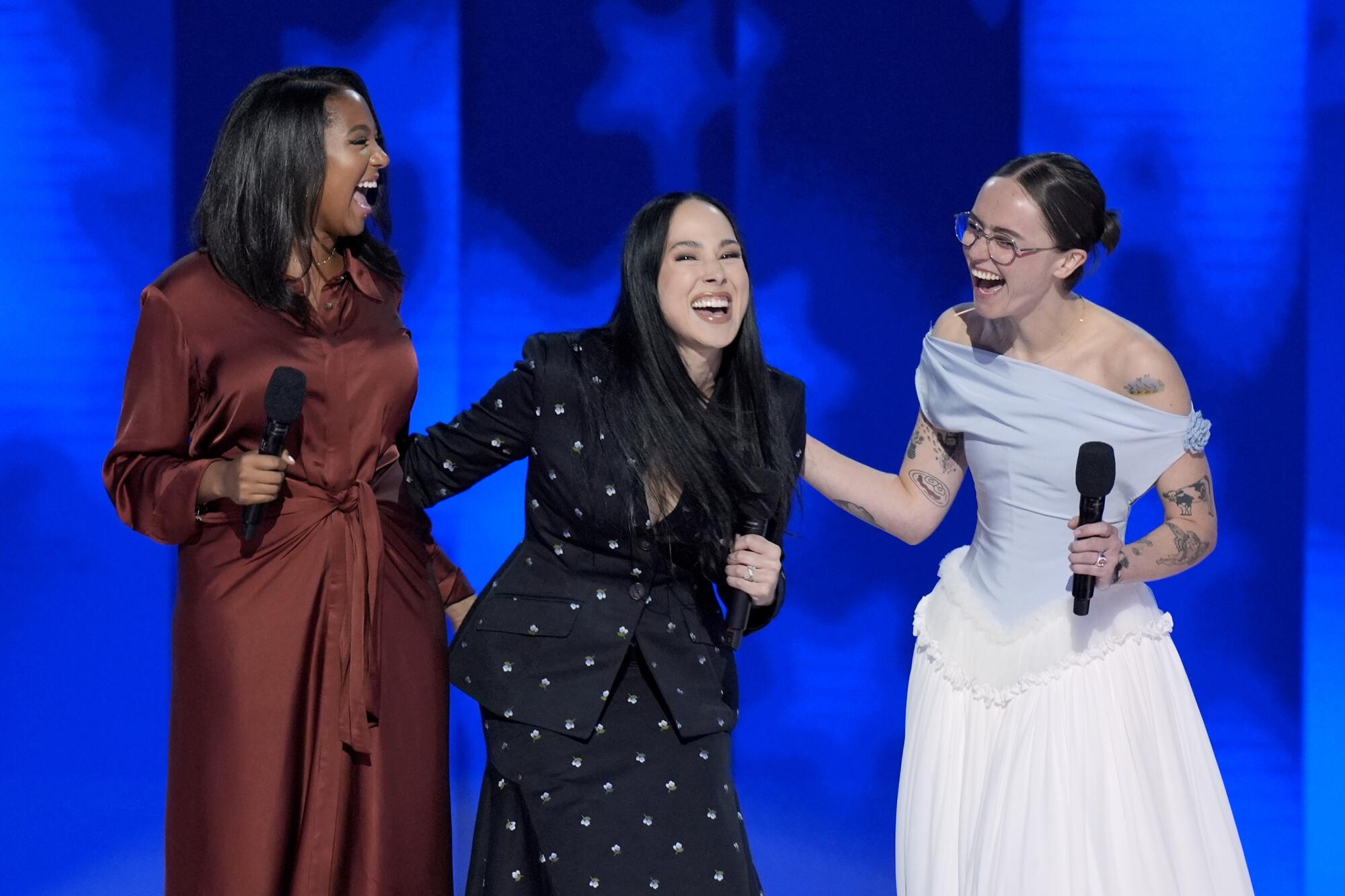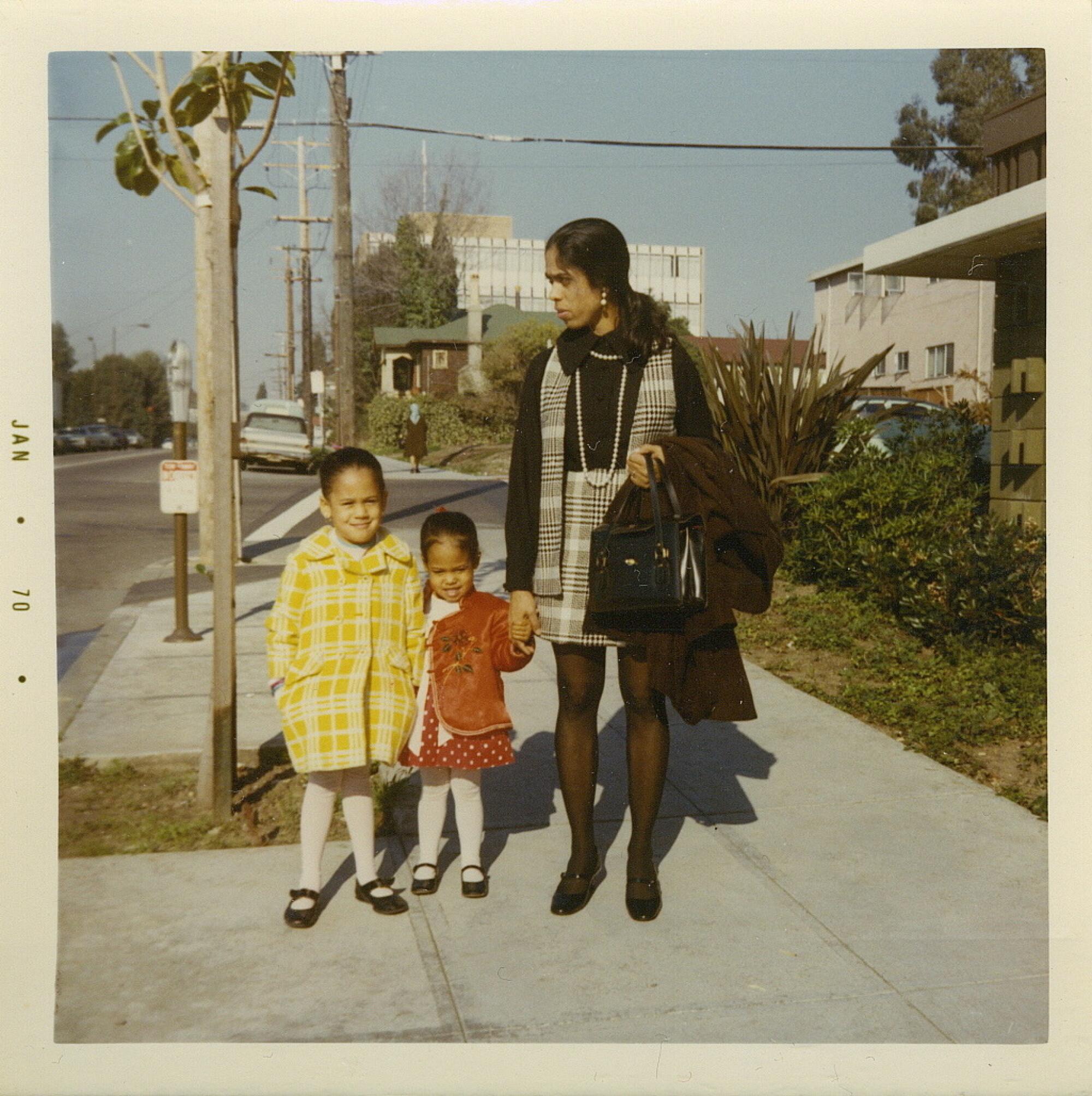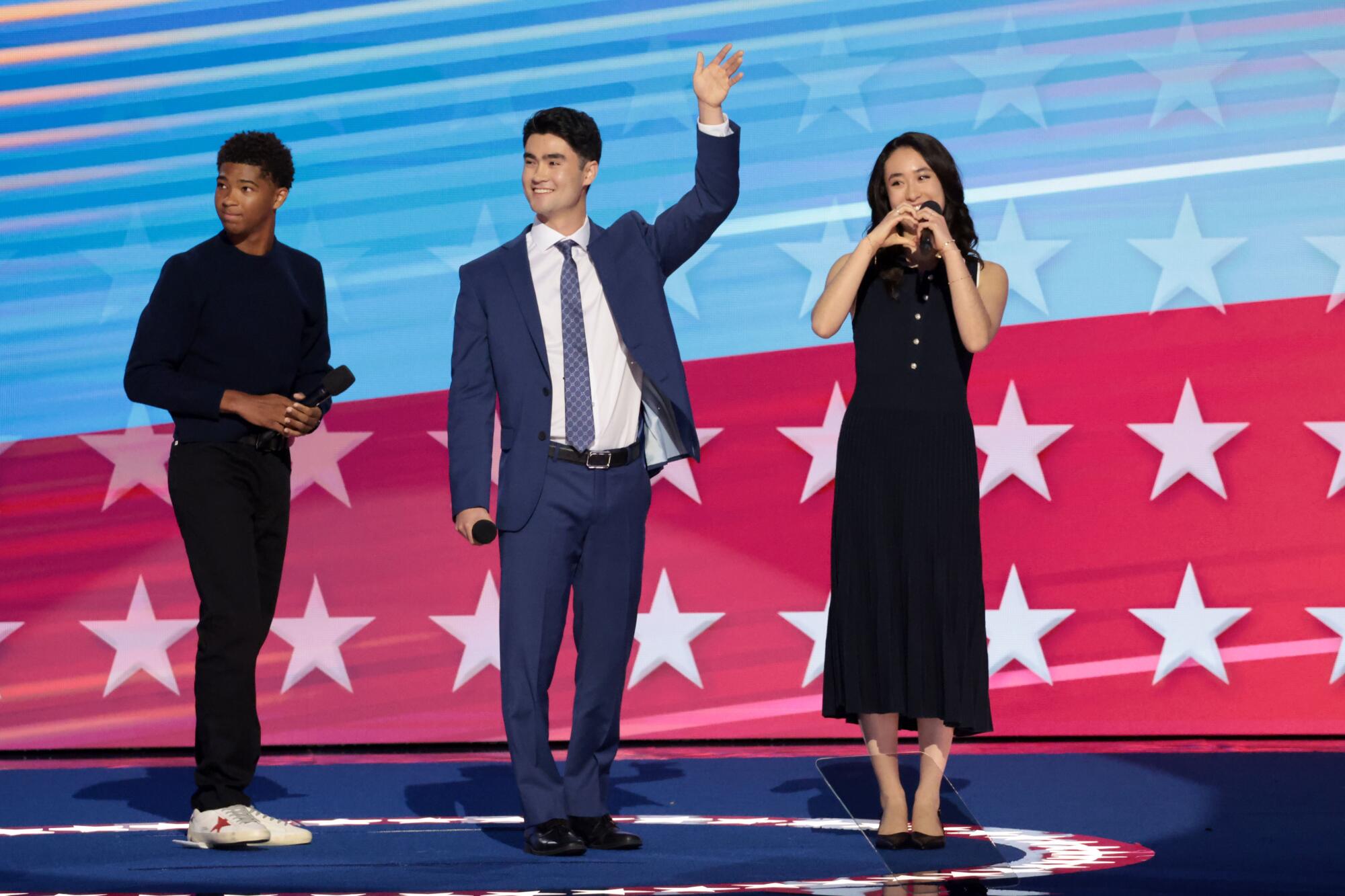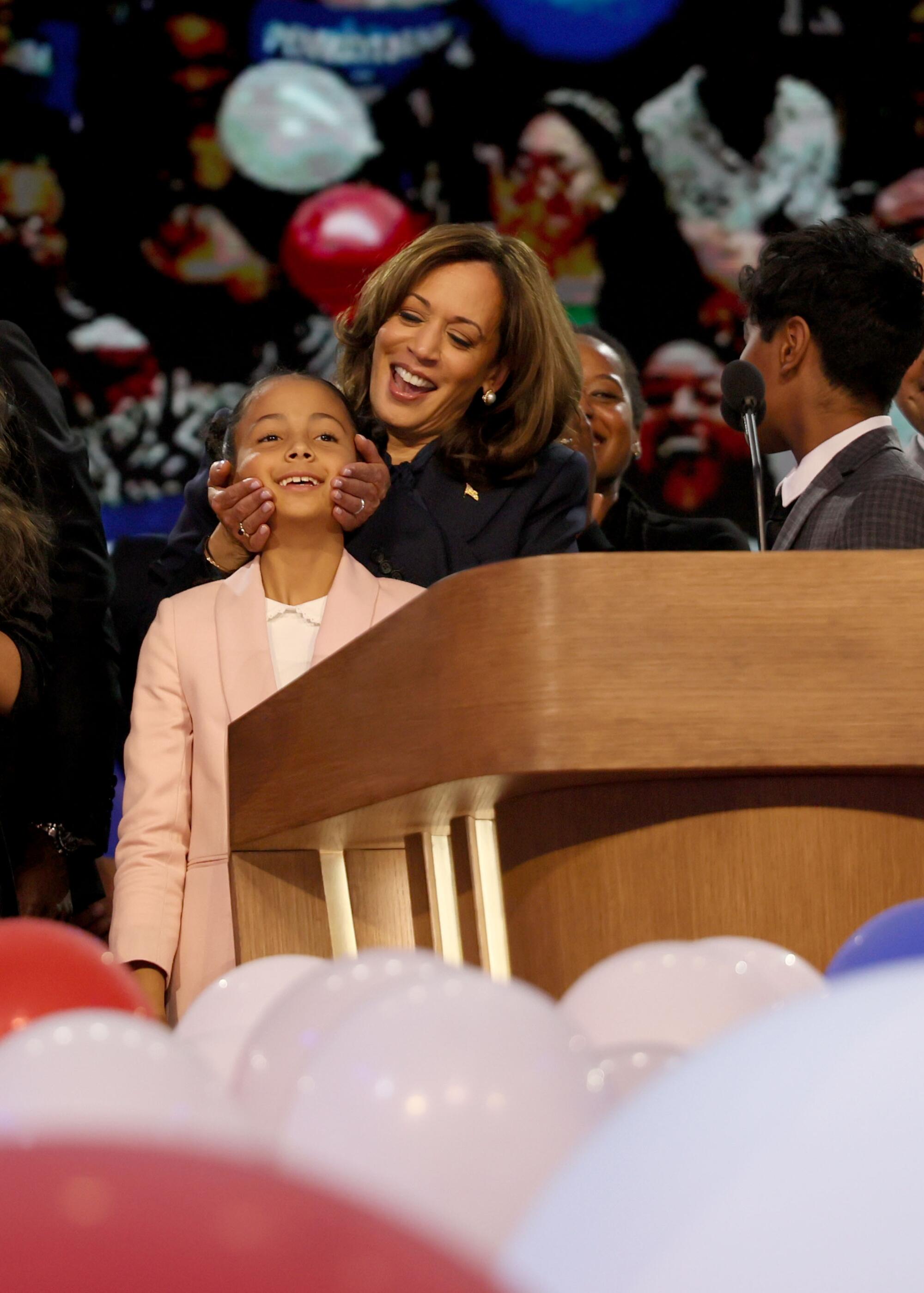As Vice President Kamala Harris has campaigned for president, she has been cheered on by what her husband called their “big, beautiful, blended family.”
And when Second Gentleman Doug Emhoff, who is Jewish, bounded on stage to join Harris at the Democratic National Convention, he was followed by her Jamaican Indian sister, white Gen Z stepchildren, Black brother-in-law and Indian auntie. Even her husband’s white ex-wife.
“We might not look like other families in the White House,” her stepson, Cole Emhoff, told the convention last month. “But we are ready to represent all families in America.”

Kamala Harris’ goddaughter Helena Hudlin, left, Harris’ niece Meena Harris and Harris’ stepdaughter Ella Emhoff speak during the Democratic National Convention in Chicago.
(J. Scott Applewhite / Associated Press)
It was a tableau of a distinctly modern American family: mixed race, interfaith and blended, a mosaic of national origins, cultures and values.
Data show “nontraditional” families — those made up of single parents, single adults, cohabiting couples and stepfamilies — now outnumber “traditional” nuclear families in the United States.
More than 4 out of 10 adults have at least one step relative, and about 16% of children live in a household with a step parent, step sibling or half sibling, according to Pew Research.
Compare that with 1960, when the United States had what Pew called “one dominant family form,” with 73% of all children living with two parents in their first marriage.
Harris, who was born in 1964, is the child of an Indian mother and Jamaican father who divorced when she was in elementary school. She married later in life, at 49, to a man of a different race who practices a different faith. She is a stepmom to the two children from his first marriage.

A photograph of Kamala Harris, Maya Harris and their mother, Shyamala Gopalan, featured in Kamala Harris’ book “The Truths We Hold.”
(Courtesy of Kamala Harris)
Harris is also one of a growing number of women who have never given birth. Last year, the U.S. fertility rate reached a historic low — and, according to Pew, the share of adults younger than 50 without children who say they’re unlikely to have kids was 47% — a 10-percentage-point increase from 2018 to 2023.
Multiracial partnerships are increasingly common, too. Nearly 34 million people — about 10% of the population — identified as multiracial in 2020, a 276% increase from 2010, according to the Census Bureau.
And for all the political wrangling about family values and diversity, the makeup of liberal and conservative families is not so different.
About 11.9% of conservatives live in mixed-race families, compared with 11.4% of liberals, a statistically insignificant difference. That’s according to an analysis of mixed-race families from the 2012 biennial General Social Survey by Northwestern University law professor and social scientist James Lindgren.
He found that about 9.5% of Republican families are mixed-race, compared with 11.2% of Democratic families.
Harris has placed her family front and center as she has made her pitch to voters. In her 2019 autobiography, “The Truths We Hold: An American Journey,” Harris recalled how her mother, Shyamala Gopalan Harris, recognized her daughters’ dual identities.
“She knew that her adopted homeland would see Maya and me as Black girls, and she was determined to make sure we would grow into confident, proud Black women,” Harris wrote.
Shyamala, a Hindu, also encouraged neighbors to take her daughters to a Black Baptist church on Sundays.

Kamala Harris’ godson Alexander Hudlin, left, Harris’ nephew Jasper Emhoff and Harris’ niece Arden Emhoff wave after speaking during the Democratic National Convention in Chicago.
(Myung J. Chun / Los Angeles Times)
As for families that arise after a divorce, they present their own challenges.
“Those of you who belong to blended families know that they can be a little bit complicated,” Doug Emhoff told the convention.
But after he and Harris married in 2014, he said, Cole and Ella decided not to call Harris “stepmom,” believing it didn’t quite fit their relationship.
“As soon as our kids started calling her ‘Momala,’” Doug Emhoff said, “I knew we’d be OK.”
Kerstin Emhoff, Ella and Cole’s biological mother, went out of her way to defend Harris after old video surfaced of Donald Trump’s running mate, Ohio Sen. JD Vance, calling Harris and other Democratic leaders “childless cat ladies” who “don’t really have a direct stake” in the future of the country.
“These are baseless attacks,” Kerstin Emhoff said, describing Harris as a “loving, nurturing, fiercely protective” co-parent. “I love our blended family and am grateful to have her in it.”
And when a television producer posted on X that “Kamala’s husband’s ex-wife is supporting her more enthusiastically than Trump’s current wife is supporting him,” Kerstin reshared the post.
“Damn right 
From the very beginning, the family trees of America’s first families have been blended, even biracial. But the details were usually kept behind closed doors.
The first blended first family was, appropriately, with George Washington.
The first president had no biological children. But his wife, Martha, had children by a previous marriage and he raised them, as well as her grandchildren. One of those grandsons, George Washington Parke Custis, fathered children with women who were enslaved.
Over the last two and a half centuries, American presidents and vice presidents have had complex family lives.
After the death of Thomas Jefferson’s wife, Martha, Jefferson fathered children with Sally Hemings, a Black woman enslaved by the family. Hemings, who was biracial, was Martha’s half-sister.
After Jefferson become president in 1801, newspapers and his opponents linked Jefferson with Hemings to discredit him. Jefferson offered no public response.
Many presidents raised their wives’ children from previous marriages. Only a handful of presidents had no biological children: Washington, James Madison‚ James Buchanan, James K. Polk and Andrew Jackson. Some presidents — including Jackson and Ronald Reagan — adopted children. Many faced allegations of illegitimate children.

Democratic presidential nominee Vice President Kamala Harris with her grand-niece Amara Ajagu during the Democratic National Convention in Chicago.
(Robert Gauthier / Los Angeles Times)
In the early 1800s, Richard Johnson, who went on to be the ninth vice president, lived openly in rural Kentucky with his Black common-law wife, Julia Chinn. While he served as a U.S. senator, she managed his plantation.
At a time when interracial marriage was banned, Johnson treated her as his wife: They attended church together and hosted formal galas at their farm for the Marquis de Lafayette and former President James Monroe. They had two daughters, Adaline Chinn Johnson and Imogene Chinn Johnson, who went on to marry white men.
But Johnson’s biracial relationship and family situation was frowned on by many Americans. After Chinn died in 1833 and Johnson campaigned for the vice presidency in 1836 under Martin Van Buren, Johnson was the subject of racist attacks and cartoons.
Although Johnson won the election, Democrats did not renominate Johnson for another term.
“So many men had these relationships,” said Amrita Chakrabarti Myers, author of “The Vice President’s Black Wife: The Untold Life of Julia Chinn.” “They hid them, they lied about them, and that was fine. What wasn’t fine was when they went public.
“There was a real fear of an interracial family becoming the first family of the United States,” Chakrabarti Myers added.
It was not until 2008 that America elected its first Black president: Barack Obama. The son of a white mother and Black father, Obama was also the first mixed-race president.
He leaned on that identity — or, as he put it, “my story of the brief union between a young man from Kenya and a young woman from Kansas who … shared a belief that in America, their son could achieve whatever he put his mind to” — as a symbol of the nation’s inexorable progress.
Over the last few decades, the shifting makeup of America’s leading political families has made for occasionally awkward moments.
In 1998, then-Vice President George H.W. Bush drew criticism when he described his three Mexican American grandchildren as “the little brown ones.”
Bush was referring to the three children of his son Jeb and his Mexican-born wife, Columba, and he said the comment had been misinterpreted. “Those grandchildren are my pride and joy,” he said.

Republican vice presidential candidate Sen. JD Vance of Ohio and his wife, Usha Chilukuri Vance, during the Republican National Convention in Milwaukee in July.
(Robert Gauthier / Los Angeles Times)
In 2013, Mitt Romney, the GOP’s 2012 nominee for president, who has more than two dozen grandchildren, celebrated the formal adoption of his 22nd grandson, who is Black.
Melissa Harris-Perry, the host of an MSNBC weekly current affairs show, drew criticism when she invited guests to joke about a Christmas photo of Romney surrounded by his grandchildren.
“One of these things is not like the others, one of these things is not the same,” said actress Pia Glenn.
But a new generation of Republican leaders is reflecting the nation’s more diverse, mixed-race families. About 1 in 8 Americans is an immigrant, and roughly 1 in 4 American children has an immigrant parent.
Vice president nominee Sen. JD Vance — a white man who was raised in Ohio and Kentucky — is married to Usha Chilukuri Vance, the child of Indian immigrants. She is a Hindu while he is a former Baptist and atheist who converted to Catholicism. The names of their two sons and daughter reflect the family’s diversity — Ewan, Vivek and Mirabel.





